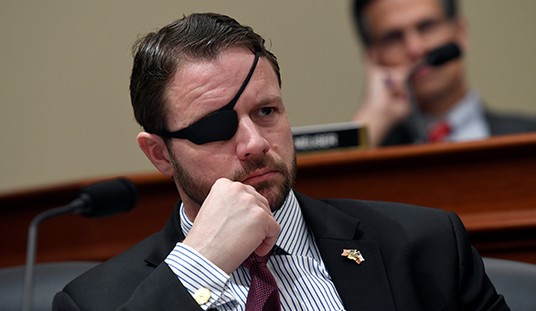Americans awoke to news today that the Obama administration had struck a nuclear deal with Iran, and that the stock market is trending up in reaction to this deal.
Evidently, Wall Street doesn’t do details anymore. It doesn’t remember that everything Barack Obama touches turns to crap. It doesn’t remember that Barack Obama thought there were millions of “shovel ready” jobs just waiting for his go-ahead and a trillion tax dollars to pay for them. It doesn’t remember that as recently as September, Obama tried to inject American force into Syria to help the Muslim Brotherhood. It doesn’t remember that this administration can’t even build a website competently. It doesn’t remember that the Obama administration is desperate for any means to change the subject from the failed Obamacare rollout. Last week the gang that can’t shoot straight dismantled the Senate’s filibuster rules to change the subject. This gang that can’t shoot straight, the gang that nearly lost Egypt to the Muslim Brotherhood, the gang that failed to protect its own in Libya and then lied about it for weeks and covers up its actions to this day, is now suddenly capable of inking a good agreement with Iran? Using what leverage? Driven by what crafty American deal-makers? Obama came to the presidency with no foreign policy experience and has not shown any growth in office. John Kerry built his career smearing the US military and marrying money. How is either man a credible deal-maker?
Not two weeks ago, the Obama administration was so desperate for a deal with Iran — any deal — that Secretary of State Kerry was happily announcing a deal at the same time the Iranians were announcing that there was no deal. Israeli Prime Minister Benjamin Netanyahu took the unusual step of blasting an American administration in order to prevent what he saw as a dangerous, one-sided, “very bad” deal in the making. Today Netanyahu is slamming the deal done over the weekend as a “historic mistake.”
Speaking to ministers at the weekly cabinet meeting on Sunday, Netanyahu said: “Today the world has become a much more dangerous place because the most dangerous regime in the world has taken a significant step toward attaining the most dangerous weapon in the world … Israel is not bound by this agreement.
“The Iranian regime is committed to the destruction of Israel and Israel has the right and the obligation to defend itself, by itself, against any threat. As prime minister of Israel, I would like to make it clear: Israel will not allow Iran to develop a military nuclear capability.”
Strong words. Netanyahu is not alone in his skepticism. Saudi Arabia is also not buying Kerry’s deal.
A senior advisor to the Saudi royal family has accused its Western allies of deceiving the oil rich kingdom in striking the nuclear accord withIran and said Riyadh would follow an independent foreign policy.
Nawaf Obaid told a think tank meeting in London that Saudi Arabia was determined to pursue its own foreign and policy goals. Having in the past been reactive to events, the leading Sunni Muslim nation was determined to be pro-active in future.
Mr Obaid said that while Saudi Arabia knew that the US was talking directly to Iran through a channel in the Gulf state of Oman, Washington had not directly briefed its ally.
“We were lied to, things were hidden from us,” he said. “The problem is not with the deal struck in Geneva but how it was done.”
So in order to make this deal, the Obama administration had to stiffarm its two closest allies in the Middle East. It also acquiesced to a deal that changes nothing on the ground in Iran’s nuclear program. It says it is allowing some inspections of some sites, but will dismantle none. Additionally, the deal is only good for six months. That may be enough time to build a bomb. Obama and Kerry are saying to Iran, “If you like your nuclear weapons program, you can keep your nuclear weapons program.” Only in this case, they mean what they say.
As if that wasn’t enough to drive up jitters, Kerry and his Iranian counterpart are now showing public differences on the deal, according to the Financial Times. Anyone who has spent any time watching the Iranians do would have expected this. The Iranian regime is as duplicitous and dishonest as any on earth.
Speaking just hours after the deal was announced, Mr Rouhani declared that “world powers have recognised the nuclear rights of Iran”. Tehran has long insisted that it has a “right” to enrich uranium under international treaties. However, this view was immediately rejected by Mr Kerry, who gave a series of television interviews in Geneva at 5am and claimed an Iranian right to enrich was “not in this document”.
Mr Rouhani also predicted that the sanctions regime against Iran had been broken and that cracks created by the agreement would “widen” – precisely the fear that Benjamin Netanyahu, Israeli prime minister, who called the agreement a “historic mistake”, has voiced about the negotiations.
However, the White House was quick to hit back against this claim. US officials said that sanctions relief amounted to $6-$7bn, not the $40bn that some Israel officials had predicted, and that Iran would still lose $30bn in revenue over the next six months from the oil and banking sanctions that remain in place.
Given all this plus domestic skepticism of the deal, even among the Democrats, on what basis is Wall Street judging this deal worthy of pushing the markets higher?









Join the conversation as a VIP Member